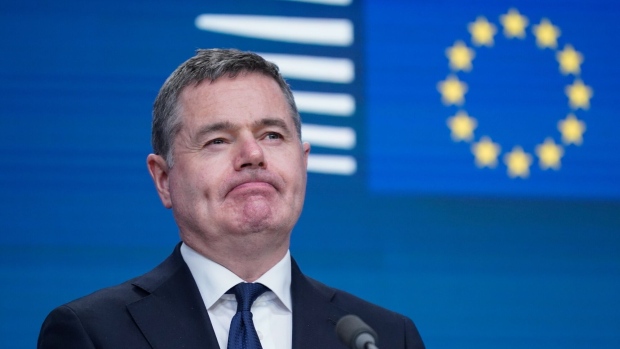Jan 15, 2024
Eurogroup Head Expects Euro Area to Grow Around 1% This Year
, Bloomberg News

(Bloomberg) -- The euro-area economy will probably grow around 1% this year as it resists the impact of high inflation and the war in Ukraine, Eurogroup President Paschal Donohoe said.
“As I look into 2024, I continue to believe that the euro-area economy is holding up well in the context of such economic challenges,” Donohoe said ahead of a meeting of euro-area finance ministers in Brussels on Monday.
“While that’s a lower rate of growth than I would otherwise like to see, it’s still growth despite all of the challenges,” he added.
Germany, Europe’s biggest economy, saw its output shrink in 2023, according to the latest data published on Monday. Though it narrowly avoided a recession thanks to an upward revision of second-quarter numbers, the slowdown is worrying for its European peers.
With the continent’s industrial powerhouse sputtering, its major trading partners may have trouble keeping their growth going as well. These include France and Italy, which are both forecasting economic growth next year though uncertainty remains around high energy costs and interest rates, and low foreign demand.
Ongoing concerns about Germany’s prospects are reflected in forecasts for this year. The OECD said in November that, at 0.6%, growth will be the slowest among all Group of 20 members except Argentina.
Many investors and analysts have been anticipating a mild downturn for the euro area overall alongside a bumpy path back to the European Central Bank’s 2% inflation target.
Asked about the slowdown in Chinese growth, Donohoe said that while it does feed into consumption of exports from the European Union, the bloc is still growing, “albeit at a slow pace.” While China is all but certain to have met its growth goal of about 5% for 2023 in data due this week, the economy is likely to have lost steam in the fourth quarter.
©2024 Bloomberg L.P.






